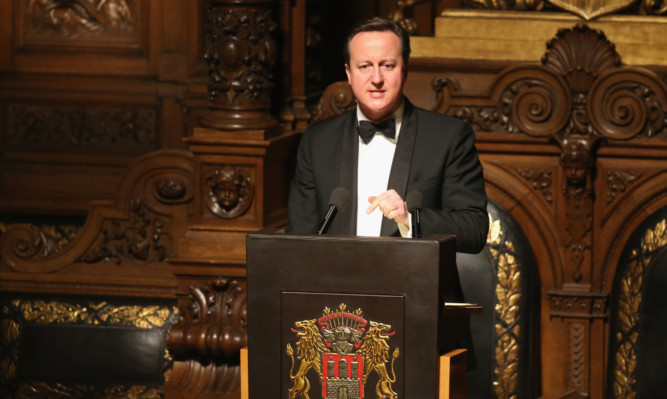David Cameron has put security at the heart of his case for Britain staying in the EU as the moment of truth approaches for his renegotiation drive.
Delivering a speech in Hamburg, the Prime Minister insisted Europe had to “stand together” against threats such as Islamic State (IS) and Russian aggression.
He also appealed for Germany’s help in finalising reforms, stressing the countries’ shared interests and values.
The comments come with just a week to go until a crucial Brussels summit that could make or break Mr Cameron’s hopes of securing a package that he can recommend to the UK public.
There are reports that US president Barack Obama is preparing to make a “big, public reach out” once the referendum campaign begins in an effort to convince Britons to vote to stay in the EU.
Senate foreign relations committee chairman Bob Corker discussed the tactic openly with witnesses during an evidence session, saying he “knew” that was Mr Obama’s intention.
Mr Cameron told the dinner in Hamburg that he was “fighting” to get the changes the UK needed to remain in the union.
He argued that Anglo-German co-operation would be vital for success, stressing his close relationship with chancellor Angela Merkel. “It is our shared commitment to enterprise that means time and again at European Council meetings it is Britain and Germany working together, standing up for cutting bureaucracy, standing up for growth and standing up for jobs,” he said.
“It is Britain and Germany – with our belief in sound finances – who are at the table arguing that you cannot spend your way out of problems and that you have to deal with your deficits.
“And I am proud of the way that chancellor Merkel and I worked to secure that historic deal to cut the European budget in real terms for the first time.”
Mr Cameron said he “made no apology” for the fact that Britain was “argumentative and rather strong-minded”.
“The need to protect our sovereignty has always been paramount for us. But we are also an open nation,” he said. “That openness drove the decision to join in 1973. Just as it drives our approach in so many other ways, including our role in bringing down the Iron Curtain and championing the entry into Europe of countries that lost so many years to communism.
“We have always been a country that reaches out. And I never want us to pull up the drawbridge and retreat from the world.
“So when it comes to the question of Britain’s future in Europe, my aim is clear: I want to keep Britain inside a reformed European Union.”
Mr Cameron said forging trade deals such as TTIP with the US, and establishing clear rules for eurozone and non-eurozone states, was good for both the UK and Germany.
“And when Britain says we need to have a Europe that respects nation states and that we should be able to run our own welfare systems – those are calls which I believe resonate around Europe,” he added.
Mr Cameron said he believed it was possible to achieve changes, and if so he would “unequivocally” recommend staying in the EU.
But he insisted the “job will not be done” even after the renegotiation, and “many things would remain to be reformed”.
“At the end of all this, the reason why I believe it is so vital to keep Britain in a reformed European Union is that when I look at the world today and where it is going I am convinced more than ever that we need Britain and Germany working together to shape a European Union that can deliver prosperity and security for us all,” he said.
“In a world where some countries claim you can be a great economic success but bypass democracy, restrict the free press and go without the rule of law, we need to stand together, and show that – far from holding countries back – these things make us stronger.
“In a world where Russia is invading Ukraine and a rogue nation like North Korea is testing nuclear weapons, we need to stand up to this aggression together – and bring our economic might to bear on those who rip up the rulebook and threaten the safety of our people.
“And in a world where people look at the threat of extremism and blame poverty or the foreign policy of the West, we need to say: no, it’s about an ideology that is hijacking Islam for its own barbaric purposes and poisoning the minds of our young people.
“And just as Europe has faced down dangerous and murderous ideologies in the past, so again we must stand together in this, the struggle of our generation.”
ends
